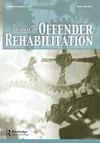Mental health needs and coping resources of participants in a prostitution pre-sentencing court program
IF 1.1
Q3 SOCIAL WORK
引用次数: 1
Abstract
Abstract There is an expanding number of prostitution problem-solving courts; however, empirical findings regarding the mental health needs of participants in these specialty courts are sparse. This study examines the mental health needs and coping resources of 33 participants in a prostitution pre-sentencing program. Levels of trauma exposure, posttraumatic stress, posttraumatic growth, and religious coping were compared to 60 participants in a prostitution problem-solving court. Both groups endorsed extensive trauma exposure and posttraumatic stress. Still, the pre-sentencing participant’s levels of posttraumatic growth and religious coping were substantial. Despite no group differences in trauma exposure or religious coping, pre-sentencing participants’ levels of posttraumatic stress were significantly higher and their posttraumatic growth significantly lower, than the problem-solving court participants. Moderation analysis showed the relation between posttraumatic stress and posttraumatic growth varied depending on whether participants were in the pre-sentencing or problem-solving court. Posttraumatic stress inversely predicted posttraumatic growth for pre-sentencing participants but not for problem-solving court counterparts. The divergence in the relationship between variables was greatest for participants with the highest posttraumatic stress. Research-guided assessments of mental health needs and coping resources can inform the recruitment of participants and the development and implementation of these programs.卖淫判刑前法庭项目参与者的心理健康需求和应对资源
摘要解决卖淫问题的法院数量不断增加;然而,关于这些专业法庭参与者心理健康需求的实证研究却很少。本研究调查了33名卖淫量刑前项目参与者的心理健康需求和应对资源。在解决卖淫问题的法庭上,将60名参与者的创伤暴露程度、创伤后压力、创伤后成长和宗教应对进行了比较。两组患者都赞同广泛的创伤暴露和创伤后应激。尽管如此,判刑前参与者的创伤后成长和宗教应对水平仍然很高。尽管在创伤暴露或宗教应对方面没有群体差异,但与解决问题的法庭参与者相比,判刑前参与者的创伤后压力水平显著更高,创伤后成长显著更低。适度分析显示,创伤后压力和创伤后成长之间的关系因参与者是在量刑前法庭还是在解决问题的法庭而不同。创伤后压力对判刑前参与者的创伤后成长有反向预测作用,但对解决问题的法庭参与者则没有。对于创伤后压力最高的参与者,变量之间关系的差异最大。以研究为导向的心理健康需求和应对资源评估可以为参与者的招募以及这些计划的制定和实施提供信息。
本文章由计算机程序翻译,如有差异,请以英文原文为准。
求助全文
约1分钟内获得全文
求助全文
来源期刊

Journal of Offender Rehabilitation
SOCIAL WORK-
CiteScore
1.60
自引率
0.00%
发文量
24
期刊介绍:
The Journal of Offender Rehabilitation is a multidisciplinary journal of innovation in research, services and programs in criminal justice and corrections. The journal is an essential professional resource for practitioners, educators and researchers who work with individuals involved in the criminal justice system and study the dynamics of rehabilitation and individual and system change. Original research using qualitative or quantitative methodology, theoretical discussions, evaluations of program outcomes, and state of the science reviews will be considered.
 求助内容:
求助内容: 应助结果提醒方式:
应助结果提醒方式:


